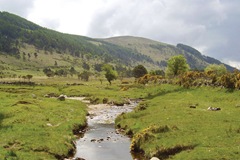Overview
 agendaNi overviews the current debate over sustainability in the region.
agendaNi overviews the current debate over sustainability in the region.
Sustainability, if implemented properly, will bring benefits to the environment, the economy and society. Ideally, using sustainable practices in all areas of society will help deal with poverty, social deprivation, unemployment, climate change, the depletion of natural resources and a weak economy.
One definition of sustainable development, decided in 1987 by the World Commission on Environment and Development (the Brundtland Commission) is: “the need for society to sustain itself by enabling people to develop skills, knowledge and creativity, while at the same time protecting natural resources and safeguarding health so future generations are not compromised by the actions we take.”
While sustainable practices such as recycling, composting and creating and using renewable energy can be carried out in the home or in businesses, the Executive and local councils ultimately draw up and implement the legislation and policies dealing with the practicalities, such as planning and the collection of recycling bins.
The draft Sustainable Development Strategy was released by OFMDFM
in May and the consultation on its implementation plan closed on 29 October.
The six guiding principles in the draft strategy are:
living within environmental limits – to protect and improve the environment and ensure that natural resources are unimpaired and remain so for future generations;
• ensuring a strong, healthy, just and equal society – by meeting the diverse needs of all people in existing and future communities, promoting personal well-being, social cohesion and inclusion and creating equal opportunity;
• achieving a sustainable economy – by building a strong, stable economy that provides prosperity and equal opportunities for all, and where the polluter pays and efficient resource use is incentivised;
• promoting good governance – by actively promoting effective, participative systems of governance in all levels of society;
• using sound science responsibly – by ensuring policy is developed and implemented on the basis of scientific evidence, whilst taking into account scientific uncertainty, as well as public attitudes and values;
• promoting opportunity and innovation – by supporting the successful exploitation of new and existing ideas to deliver economic, social and environmental benefits.
However, the plan was criticised for being short on detail, running to just 42 pages. NICVA was scathing in its response, saying: “This draft document, as it stands, is too vague to drive the kind of change and the kind of participation that is needed.
“The choice is not, as the document states, between a high-level, enabling document and a finely detailed, technically based document that is difficult to understand, but rather between one that is high level and vague, and therefore commits to little in terms of outcomes, and one that actually states what specific strategic outcomes are being sought.”
To increase the number of jobs in the low carbon economy, OFMDFM says it will undertake a strategic assessment of how innovation and sustainability programmes can create opportunities for Northern Ireland. It will also publish a comprehensive programme to promote and facilitate ethical and fair trade by 11 March 2011.
On the social side, the department will implement the anti-poverty and social inclusion strategy agreed in March 2010 and develop a three-year child poverty strategy by 25 March 2011.
Sustainable development principles would also be incorporated into the design on new build projects which aim to achieve ‘excellent’ ratings from the BREEAM assessment. The department will also “promote and encourage” sustainable development by holding an “annual awareness raising and awards event.” It also plans to work with DFP and suppliers to reduce the carbon emissions associated with distribution of procured goods. In addition, the cross-government Sustainable Development Champions’ Group will bring forward recommendations on greenhouse gas emissions management in the wider public sector.
Deputy First Minister Martin McGuinness has indicated that all 12 departments have brought forward comprehensive programmes of activity supporting these strategic objectives.
However, there is a sense that not enough is being done, as Green Party member Steven Agnew contends.
“We welcome the fact that the strategy has been consulted on and that there is some awareness that there needs to be a strategy but my fear is that sustainability is not high enough on the agenda,” he told agendaNi.
“There’s not a great understanding of sustainability, not just in terms of climate change but in terms of making efficiency savings within departments.”
The fact that the Coalition Government, which claims to be the greenest in history, has cut the Sustainable Development Commission does not bode well.
“The Green Party has been campaigning for the Northern Ireland Sustainable Development Commission to be kept,” Agnew adds.
It costs the Executive £120,000 to run the body. “Our concern would be that they would want to be seen getting rid of NGOs and making savings, but the savings would only be very small and short-sighted.”
He concludes by warning that while the economy understandably is taking precedent, to take sustainability off the agenda altogether would be “a big mistake.”





